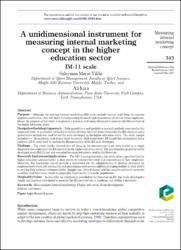| dc.contributor.author | Yıldız, Süleyman Murat | |
| dc.contributor.author | Kara, Ali | |
| dc.date.accessioned | 2020-11-20T14:54:39Z | |
| dc.date.available | 2020-11-20T14:54:39Z | |
| dc.date.issued | 2017 | |
| dc.identifier.issn | 0968-4883 | |
| dc.identifier.issn | 1758-7662 | |
| dc.identifier.uri | https://doi.org/10.1108/QAE-02-2016-0009 | |
| dc.identifier.uri | https://hdl.handle.net/20.500.12809/2161 | |
| dc.description | WOS: 000407421700006 | en_US |
| dc.description.abstract | Purpose - Although the existing internal marketing (IM) scales include various scale items to measure employee motivation, they fall short of incorporating the needs and expectations of service sector employees. Hence, the purpose of this study is to present a practical instrument designed to measure the IM construct in the higher education sector. Design/methodology/approach - Both quantitative and qualitative research methods were used in this empirical study. A qualitative method was used to develop the scale items to measure the IM construct and a quantitative method was used to test the scale developed in the higher education sector. The study sample included n = 240 academic staff from a large university. Both exploratory (EFA) and the confirmatory factor analyses (CFA) were used to confirm the dimensionality of the IM scale developed. Findings - The study results showed that all items in the measurement scale were loaded on a single dimension that represents the IM construct in the higher education sector. The psychometric properties of the developed scale (IM-11) met and exceeded the expected criteria cited in the literature. Research limitations/implications - The IM-11 scale presented in this study offers a practical tool for higher education administrators in their efforts to measure the needs and expectations of their employees. Moreover, this knowledge should provide a framework for the administration to develop strategies for employee motivation, job satisfaction and performance and assume additional responsibilities in their efforts to serving their external customers better. Sample size, cultural factors and the complex nature of university academic staff limit one's ability to generalize these results to broader populations. Originality/value - In line with the information provided in the literature on IM, this study developed a simple and practical instrument to measure the IM construct for an academic unit within a university. | en_US |
| dc.item-language.iso | eng | en_US |
| dc.publisher | Emerald Group Publishing Ltd | en_US |
| dc.item-rights | info:eu-repo/semantics/closedAccess | en_US |
| dc.subject | Measurement | en_US |
| dc.subject | Internal Marketing | en_US |
| dc.subject | Higher Education | en_US |
| dc.subject | Scale Development | en_US |
| dc.subject | Internal Customers | en_US |
| dc.title | A unidimensional instrument for measuring internal marketing concept in the higher education sector IM-11 scale | en_US |
| dc.item-type | article | en_US |
| dc.contributor.department | MÜ, Spor Bilimleri Fakültesi, Rekreasyon Bölümü | en_US |
| dc.contributor.institutionauthor | Yıldız, Süleyman Murat | |
| dc.identifier.doi | 10.1108/QAE-02-2016-0009 | |
| dc.identifier.volume | 25 | en_US |
| dc.identifier.issue | 3 | en_US |
| dc.identifier.startpage | 343 | en_US |
| dc.identifier.endpage | 361 | en_US |
| dc.relation.journal | Quality Assurance in Education | en_US |
| dc.relation.publicationcategory | Makale - Uluslararası Hakemli Dergi - Kurum Öğretim Elemanı | en_US |


















